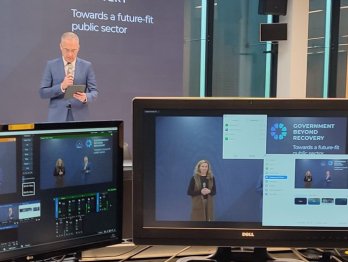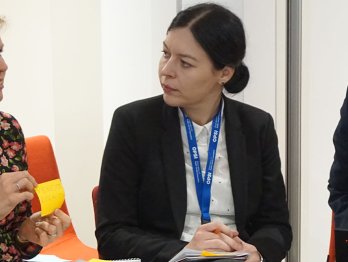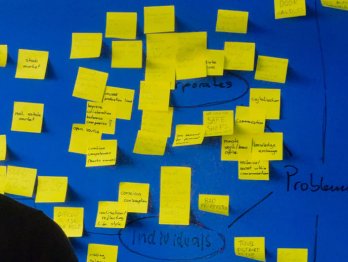COVID-19: Innovative responses update #5

This is our fifth update about innovative responses (including public sector innovation, digital government or open government) being undertaken around the world. Thank you again to all who have contributed in answer to our call and to our partners (including the Centre for Public Impact and GovInsider) for helping us to collect innovative practices. We hope that teams around the world can learn from each other and take inspiration from the information collected. There are now over 260 examples and initiatives in the collection, and these are helping deepen our knowledge and understanding of how the public sector and its partners are responding to one of the most significant crises of recent times.
What can we observe from the additions made since our last update?
- Infection control or tracking measures: the State of Nuevo Leon in Mexico created a hospital restructuring plan to increase care capacity, while the Czech Republic established a multi-channel ‘smart quarantine’ strategy including a contact tracing app as part of its response to the pandemic. Austria has launched an Epidemiological Reporting System which consolidates testing results and thus provides real-time information about the extent of the pandemic in the country, and the Austrian Red Cross has launched a ‘stop corona’ contact tracing app. Elsewhere, the City of Vienna has created a ‘Homecare’ app to support patients and potentially infected to be digitally monitored in their homes.
- Improving communications/providing targeted information: in India the government has created an app to help citizens understand their risk and the symptoms of COVID-19, while in Mexico one state created a range of digital tools and platforms to help communicate about the pandemic including a microsite to share budget information relating to the crisis. The Czech Republic has created a central official information resource portal for the public with crisis relevant information, and in Uruguay an app was launched to help provide information and provide guidance for those with symptoms. Morocco provided an open source tool offering a consolidated view of all relevant data, whereas in Austria the chatbot ‘Mona’ was created to help answer questions from businesses about the crisis and economic responses. Austria has also established a transparency portal which provides a central overview of funding opportunities for citizens and companies related to the crisis, as well as a platform to share information about security issues (such as videoconferencing) and the crisis.
- Service delivery in a crisis/adjusting to context:
- in Mexico the State of Chihuahua created an integrated strategy to aid the response to the pandemic being systemic
- in relation to education, the Czech Republic has created an official portal for schools, students and parents with resources to support them with distance learning, as has Morocco, and Romania launched the ‘Reaction for Education’ initiative to make digital technology and distance learning accessible to disadvantaged communities
- in regards to healthcare, the Czech Republic has launched ePrescription and eSick note services to help avoid unnecessary face-to-face interactions, while Morocco also created a teleconsultation platform for free medical advice
- in the Lithuanian city of Vilnius public space is being shared with hard-hit bar and restaurant owners so that they can put tables outdoors to observe physical distancing laws but continue to serve customers
- Morocco has digitised a range of administrative procedures and issued guidance and support for teleworking by civil servants
- California has introduced remote marriage licenses and wedding ceremonies during the pandemic, similarly to Morocco where an online authorisation certificate for marriage was established
- Austria has provided a range of free practical ecommerce webinars to assist businesses with adapting to online sales and created a digital marketplace to support smaller retailers in building their own e-shops, as well as providing explanatory YouTube videos to assist businesses in understanding various support initiatives that have been put in place, and centralized information and introduced simplifications and administrative relief for businesses
- the National Statistical Institute of Romania has developed some experimental statistics and real-time data collection, sharing and analysis to better understand economic activity during the pandemic.
- Social solidarity and ‘caremongering’: the Czech Republic established ‘Data against COVID’ to provide access to technology experts and skilled volunteers to assist the government in its response to the crisis, while the Australian State of Victoria has created a portal to connect people with each other and with digital experiences and activities to support them through social isolation and distancing. Meanwhile, Austria has launched ‘Digital Team Austria’, a cooperation of companies from the digitisation sector offering digital services to SME free of charge for at least three months.
- Leveraging and redeploying existing resources and solutions: in Portugal the platform Patient Innovation has added a COVID-19 aspect to help collect and share innovative responses from patients and citizens more broadly. One state of Mexico has entered into alliances with a range of players to meet a variety of health and logistical challenges. Austria is supporting its food industry with a platform to help redeploy workers from other sectors into the food industry during the pandemic and one to help tackle the labour shortage in the food industry. Austria has also created an ‘extraordinary civil service’ to gather and assign volunteers to support the health, social and care sectors of the economy. On another note, the Coronavirus Tech Handbook provides a crowdsourced library of tools, services and resources relating to COVID-19 responses.
- Open calls, hackathons and other challenge-mechanisms:the US National Institutes of Health launched a US$500m challenge to develop rapid coronavirus testing technologies, whereas Austria has issued a research package calling for the development of solutions to various COVID-19 related problems using artificial intelligence. Austria also had a ‘hack the crisis’ hackathon.
- Structural responses and possible longer-term shifts: in India one of the provinces established a COVID-19 war room to oversee the response to the pandemic, while in Mexico five of the states established a coordination effort to harmonise actions and create a shared fund. One Mexican state also established a central contingency centre for the pandemic. In the US the National Institutes of Health launched a public-private partnership to develop an international strategy for a coordinated research response to the pandemic, while in France the city of Paris is converting a number of road lanes for cyclists and pedestrians to assist with social distancing. In addition, the French government has made its support package for Air France conditional on them cancelling domestic flights competing with train lines, while the Swiss government made their support package for the Lufthansa airline conditional on adherence to future government climate targets.
Reflections and new thinking
As an addition to this series of updates, we are going to start noting some of the relevant thinking and writing about that has been instigated by the crisis. For this update, we note Dan Hill’s ‘Slowdown Papers’ exploring how the coronavirus crisis is an articulation of broader climate, health and social justice crises and the second-order implications.
Caveat
The innovative initiatives here are represented as best as we can, given the information available. Additionally, these examples are included as observations, with no judgement made about their merits. Innovative responses are, by definition, new, and it takes time to know whether new things work, and if they work, whether they are appropriate or wanted.
If you know of other examples, we want to hear from you
We need your help in continuing to add innovative initiatives to the coronavirus crisis to our tracker and in disseminating the call. This not only helps us to gather data to inform our research and support of governments, but it helps others to share ideas and replicable solutions with others around the world. All our work on this topic will feed into the broader work of the OECD in compiling data, information, analysis and recommendations regarding the health, economic, financial and societal challenges posed by the impact of Coronavirus (COVID-19). Please visit the dedicated page for a full suite of coronavirus-related information.









